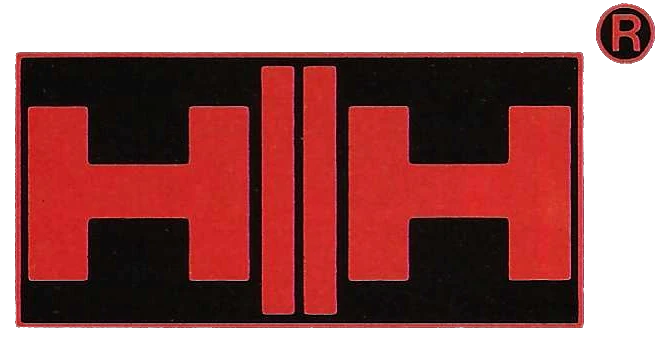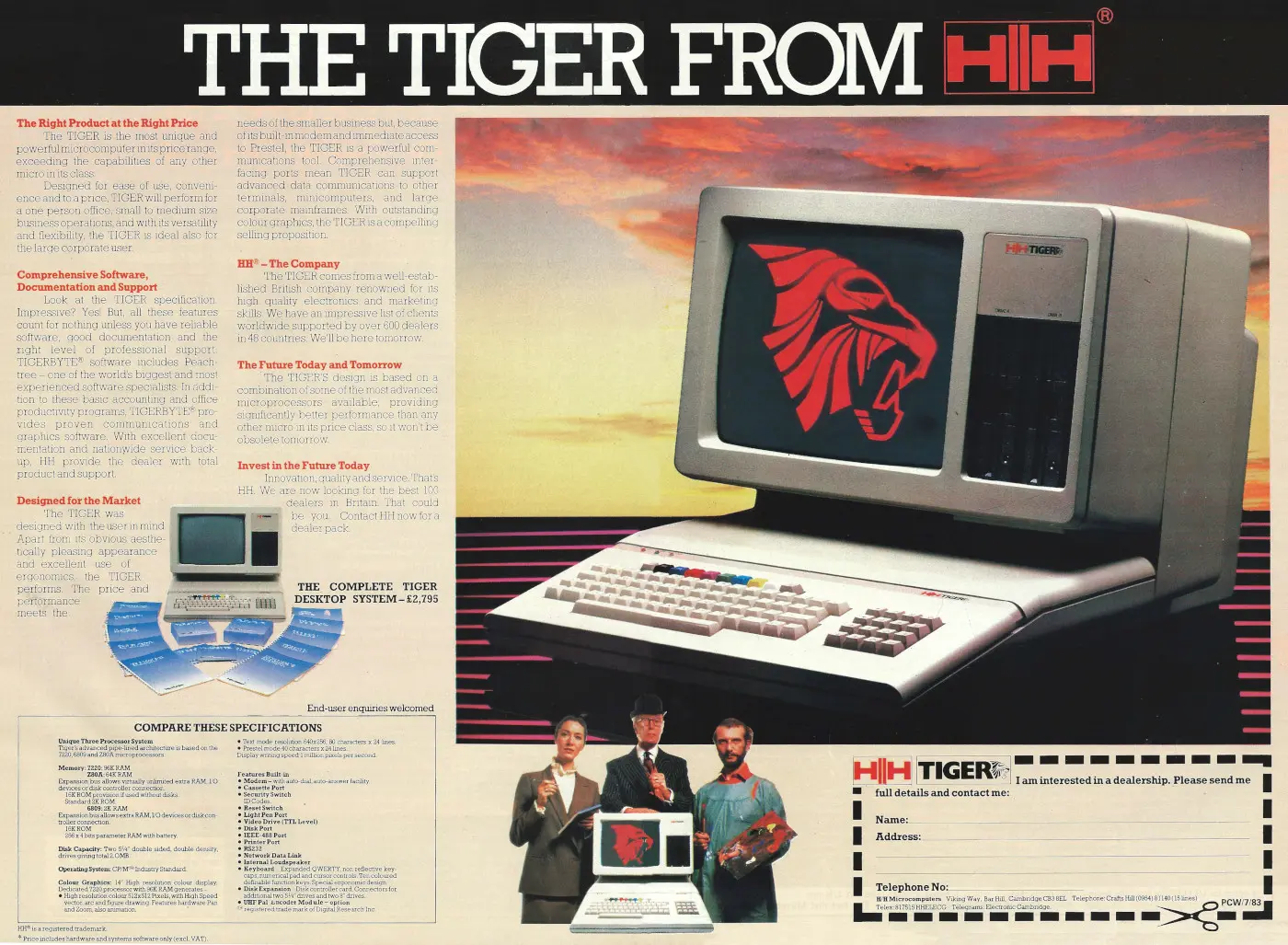
HH Advert - July 1983
From Personal Computer World

The Tiger from HH
Whilst there had already been a few computers produced by regular electronics companies, such as Heathkit with its H9, there's probably no other example of a company that was famous for building amplifiers and PA moving in to the micro game.
But here it is: HH had been founded in 1968 near Cambridge and produced a range of studio amplifiers, some of which were apparently used by the BBC[1].
The Tiger was actually designed by Tangerine - producers of the Microtan - with the intention of it originally becoming an improved desktop version of the Microtan, called Microtan 2, albeit based on the Z80 processor rather than the previous model's 6502.
That never happened, but the design - which was known as the Tigress whilst being developed within Tangerine[2] - was sold to HH in 1982. HH turned the design into the Tiger, with the first prototypes appearing in the summer of 1983.
It was also considered something of a "look-alike and sound-alike" of the Torch Communicator, and apparently gave HH's Cambridge neighbours a bit of a grump.
Writing in August 1983's Personal Computer World, Guy Kewney suggested that Torch's Martin Vlieland-Boddy was "speaking some somewhere off his trolley" when the latter had said:
"About 15 months ago, HH came to us with the request that it wanted to manufacture the Torch, and we let the engineers come in and be privy to the design or the Torch, such as the colour graphics, the dual processor and the modem".
Vlieland-Boddy seemed to conveniently gloss over the fact that it was actually the 1981 BBC Micro which provided the Torch's graphics, and even so, colour graphics in micros weren't exactly new, going back to the Cromemco Dazzler of 1976.
Not only that, but HH's managing directory Mike Harrison suggested that the idea of the Tiger being a copy was even sillier, as:
"Torch in fact approached us because it wanted to have us build its system. We had a factory, together with an enormous amount of freehold land, with some six years of experience, whereas Torch was a startup, with no factory".
That approach - and the first time HH had any access to Torch's "secret" documentation - was apparently some four months after the Tiger had been completed. Furthermore, Harrison pointed at that Torch only showed off some general design ideas, with "no detailed technical specifications".
The situation was bad enough that HH's Harrison was thinking of taking out an injunction against Torch to prevent it from making "unfounded allegations", which Maggie Burton, Personal Computer World's features contributor, confirmed when she reported:
"HH has put a request through its solicitors that Torch retract its statements, though HH's sales director John Kerr explains: 'We didn't want to respond'. When asked if he felt the whole affair was a storm in a teacup, Vlieland-Boddy replied 'Oh yes - at the end of the day it'll all go quiet'"[3].
The machine itself was a little unusual in running three processors: a Zilog Z80A for CP/M support, a Motorola 6809 - the same chip as used in the Dragon - purely for input/output, and NEC's 7220 graphics processor with its own 96K of RAM to supports its high-resolution 512x512 display.
It was also unusual for a business machine in having a cassette port - a feature also found on the Torch - with an option for a UHF output, so the 13lb/6kg keyboard/base unit could in theory be hauled home and plugged into a television.
Also, like the Torch, it came with a telephone jack which meant it could be plugged straight into a phone line.
Its review in November 10th 1983's Personal Computer News was quite favourable, with Susan Curran concluding:
"Obviously 8-bit colour graphic communicating micros aren't everyone's cup of tea, and with this mix of capabilities the Tiger is markedly more expensive than a very basic CP/M machine, even though it compares favourably with most such machines expanded to support colour graphics. Tiger would make a superb upmarket executive machine, the Rover of the micro world perhaps, particularly with its Prestel capability. And it has obvious appeal for designers, advertising firms and other people who can make full use of this level of graphics capability[4]."
It retailed for £3,200 (including VAT) - about £14,100 in 2026.
After the diversion of the "Tiger", the company moved up to Huntingdon and continued to produce studio amps and PA speakers, before being bought out by Laney Amplification.
The company identity remains and still produces equipment in the West Midlands, as part of Laney Amplification.
Date created: 27 October 2014
Last updated: 11 March 2025
Hint: use left and right cursor keys to navigate between adverts.
Sources
Text and otherwise-uncredited photos © nosher.net 2026. Dollar/GBP conversions, where used, assume $1.50 to £1. "Now" prices are calculated dynamically using average RPI per year.